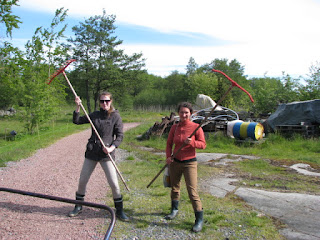In
the beginning, when there were 7 farms...This is how many stories
start on the island of Vänö. And when you look around, indeed, it
is easy to see how stories have thrived on this imaginative
landscape. Located on the southern part of Turku archipelago, Vänö
is a unique mixture of grand Ice Age rocks, huddled together like old
women, and lavish green fields that is a dream come true for the
local population of sheep. Secret pathways, the salty and refreshing
smell of sea in the air and the native juniper thicket is probably
what made archipelago people hundreds of years ago create stories of
magical trolls, sea serpents and beautiful forest nymphs. However, if
you want to hear truly amazing stories, ask anyone about the famous
smugglers of Vänö that went on dangerous adventures for more than
three decades in 20th
century.
Nowadays,
while Vänö community mainly consists of 12 year-long residents,
during the summer months it becomes clear that what defines this
community is not the number of people who stay during the winter
times but rather the number of people who call this place home. Vänö
Vänner, the local organization founded by the initiative of the
community, has been actively organizing events since 1994. However,
since 2011 they have been participating in European Voluntary Service
(EVS) projects which involved hosting volunteers from all over Europe
and, therefore, exchanging cultural values, introducing sustainable
agricultural and cultural practices and, most importantly, building
friendships. This summer, Vänö is hosting three volunteers – two
volunteers from Romania as part of a project “Culturescape
Archipelago”, and me, an anthropology student hunting for answers
to what exactly is Vänö community.
I
first heard about Vänö from my classmate, Eelin, who is, so to say,
paljasjalkainen1
of Vänö. Her stories of life in archipelago spawned curiosity and
wonderment, and I had to see it for myself. However, Vlad who comes
from Petrosani in Romania says he has been driven to do this since he
started college; quite simply he wanted to “help someone that
needed my help”. Ioana, from Cluj-Napoca, says that the project
‘spoke’ to her. After thorough search for applicable projects,
she found “Culturescape Archipelago” to be specially created for
her. “So I did not come here only because of the place but also
because the program and activities,” she says. Their average work
day here consists of outdoor tasks such as cutting and trimming the
grass, maintaining nature paths for tourists, eradicating invasive
plants, collecting recyclable waste material and other agriculture
oriented activities.
Even
though Vänö is not a very big island, I remember that when I first
got here, it was hard to orient myself around. Coming from a town in
Latvia that is hidden away in the forest, I felt very comfortable
exploring the narrow paths throughout the forest, however, following
the directions on the rocky terrain was quite hard at first. Even
during small distances, like five minute walk to Ioana’s cottage, I
had to stop several times and check if I am going the right
direction. Meanwhile, my first impression of the community was very
welcoming and positive and it didn’t take long to get used to
unlocked doors, moonless nights and the constant whisper of sea.
Ioana agrees and comments that upon her first arrival, she was very
impressed by the landscape, people and their life stories. “The
things I like best about this place,” adds Vlad, “are the
climate, flora, wildlife and let us not forget about the bread.”2
This
is our second month on Vänö and things are still surprising.
Surrounded by sea and wonderful people, we have experienced not only
the part of hard work but also community gatherings on Midsummer and
Vänö day. “These people have created their own jobs and
occupations, for example, selling sheep meat, opening a shop in the
harbour, renting cottages to tourists, building sauna and having a
business with it or online shop with handmade clothes. I am also
fascinated by their attention to details, like how cute and lovely
they make outside toilets, for example. Or how much attention they
give to cleaning nature paths for tourists,” she says. And when it
comes to learning, Ioana admits that she will have a lot of knowledge
to take home with her – how to take care of landscape, boats and
how to organize her life. Indeed, it only seems on the surface that
the life on Vänö is a slow paced country side calm. Living here it
becomes clear that it rather works like never-tiring mechanism where
everyone can find their own way to contribute.
1 Direct
translation „barefoot” (in Finnish) but is used to describe
someone who has been born in a place, is native of it, and belongs
there.
2
Pirjo
Hoffström’s homemade bread is probably the best in archipelago!






Inga kommentarer:
Skicka en kommentar